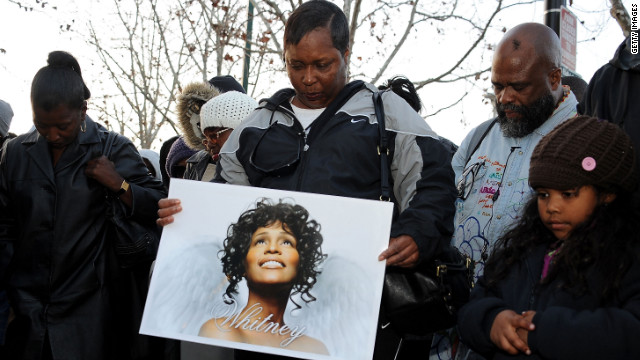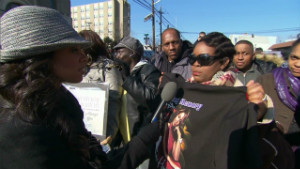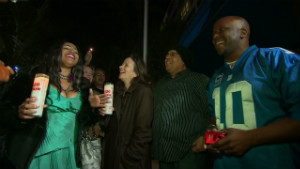
- There have been debates about all the attention that Whitney Houston’s death has received
- It’s OK to mourn for people you never knew.
- There are different types of grief — grief for celebrities, for troops, for family members.
- When it comes to grief, there’s no competition between one kind and another.
Editor’s note: Josh Levs covers a wide range of top stories across all platforms for CNN. He tells his own story in his TEDx Talk, “Breaking the System to Achieve the Impossible.”
(CNN) — The backlash started in the days after Whitney Houston’s death was announced.
It showed up in conversations, blog posts and, probably more than anywhere else, social media.
The complaint: A celebrity’s death shouldn’t get so much more attention than the deaths of other people — especially troops who lay their lives on the line every day.
Some people got into heated debates on Facebook. (For the record, fights with random people over social media are almost always futile.)

The term “celebrity-obsessed culture” got thrown around by one side, while the other side responded that it’s OK to mourn whomever you want, however you want.
Having covered the deaths of our soldiers as well as that of Houston, I found the debate surreal.
Not because the people raising this question don’t have an important, larger point. They do. But because the complaint confuses different realities.
It compares distinct worlds of mourning, each of which has no value in the other.
Perhaps ironically, no one knows that better than stars themselves.
When we lose a troubled icon, the confluence of emotions hits us in a powerful way: Grief and sadness for the loss. Guilt for any smirking we may have done collectively over the star’s troubles. Fear that comes from the reminder of death, of how ephemeral everything is.
But, aside from the most rabid fans, we remain fully aware that we didn’t actually know the person. You don’t know someone you’ve never met. You know an image, a talent, a body of work, an emotional truth that comes through. Not the person. Of course, many of the best icons make us forget that.
 Fans remember Whitney
Fans remember Whitney
 Fans mourn at Whitney Houston’s grave
Fans mourn at Whitney Houston’s grave
 Houston fans mourn her death
Houston fans mourn her deathWhen we lose a star, it’s painful and tragic. But certainly not the same as mourning what’s real in our lives, the loss of those we’re close to.
Stars know what it is to have cheering crowds chant their names, strangers stop them for autographs and people scream “I love you” on the streets — minutes before they sit alone in a hotel room missing the people they love.
Those with any sense of perspective know what’s “real,” what matters most.
So while stars are “mourned” by millions, they’re mourned by their loved ones the same as you and me. That’s part of what struck me about the moment when Bobby Brown, Houston’s ex-husband, mourned her on the night of her death — while performing at a concert. It was the clashing of those two realities: A man apparently aching for the woman he knew and loved, before a crowd of thousands who knew only the icon.
It’s also why, as a father, I was uncomfortable with a moment at Michael Jackson’s public, televised funeral when his then-11-year-old daughter, Paris, took to the microphone.
While to many it helped humanize him — and I respect those who loved the moment — to me, it violated an invisible boundary that should separate the two realities. That event wasn’t the private service to mourn Jackson the real man. It was a global goodbye to the icon. Adults can do both at once, mourning someone they knew at a service that also helps millions say goodbye to a star. I’d rather see children stay safely inside only the world of the real person they loved.
Then there’s another kind of mourning — for people you never knew, or even knew of individually.
Thinking of our fallen troops and the families they’ve left behind is so critical, CNN.com has devoted an entire interactive section highlighting the thousands lost in Iraq and Afghanistan. I’ve shown it on the air many times and often visit it myself.
Reflecting on the lives and sacrifices of these heroes is profoundly difficult and profoundly important. You feel it in your heart, your mind and your gut. It sticks with you. It can change you.
It’s unlike the sudden emotional clobbering of an icon’s demise. It’s another distinct kind of grieving.
The sacrifices of our troops should get more attention, as should the daily challenges of military personnel and their families who are still with us. It would be wonderful if some of the energy expended on mourning an entertainment star was spent taking pragmatic steps to alleviate those struggles and take on all sorts of other worthy endeavors.
But when it comes to grief, there’s no competition between one kind and another.
In the end, troops are mourned by their loved ones just like the rest of us — just like Houston and Jackson. There’s nothing better or worse about having masses grieve for a star’s passing. It’s just part of the trajectory of stardom.
An icon’s life and death take place in a spotlight. But ultimately, those of us fortunate enough to have loved ones in our lives are mourned the same.
When it comes to that kind of grief, there are two ways to see it: Either there are no stars, or everyone is one.


You must log in to post a comment.